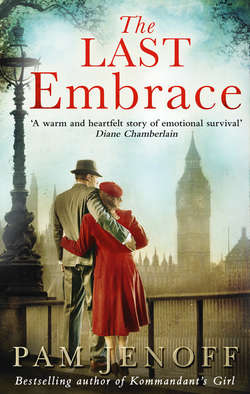Читать книгу The Last Embrace - Pam Jenoff, Пэм Дженофф - Страница 7
Оглавление
New Jersey August 1944
I sense home before I can see it. Five miles out, the wet salt air enters my mouth and fills my lungs, and the cries of the gulls rise harshly to meet me. But it isn’t until I round the final curve and the wide expanse of murky brown water springs into view that the lump in my chest grows and my eyes begin to burn.
“Damn you,” I say aloud as I pull to the side of the road. “God damn you to hell.”
Absecon Bay remains unmoved. Its calmness seems hypocrisy.
I shift Uncle Meyer’s Buick into gear once more; the engine revs weakly. It is midafternoon and the sun glistens high above the water, the air late-summer warm. The smell of fresh lemon polish rises from the dashboard, mingling with the sea air and lingering cigar smoke. A station wagon passes in the opposite direction, laden with beach chairs and a barbecue grill. Despite the war, some things have not changed: the flight of the summer renters, dusting the sand off their sticky-fingered children and returning to normal life as Labor Day nears, is still the earliest sign of fall. Along the Black Horse Pike on my way down the shore, the prices of peaches and cherries and other summer produce, plentiful even while other food is in short supply, have been slashed, preparing to give way to apples and gourds. Hand-painted signs tout end-of-season corn. Some of the drive-up stands that did a brisk business in hot dogs and root-beer floats all season have already closed.
I pull onto the road, passing signs that exhort me to watch the coast vigilantly for German ships and to buy war bonds. As I guide the car along the edge of the bay, high sea reeds rise from the marshes, obscuring my view of the water. Exhaling, I focus on the casual tangle of shops ahead. Everything had seemed so much bigger in my mind’s eye. Now the houses, with their blackout curtains and flags, are miniature, like the ones Uncle Meyer built alongside his model railroad. The whole place could use a good coat of paint.
I begin to climb the gentle arc of the bridge. A narrow strip of water lined with docks and small boats comes into view. I startle, accidentally slamming on the brake and scarcely hearing the car horn that blares behind me.
I wipe my damp palms against my cotton skirt, which has become wrinkled during the drive. Then I press my foot against the accelerator and continue south, clenching the steering wheel, knuckles white. “Knock it off,” I mutter aloud through gritted teeth, “or you’ll never make it.” Which, as I think about it, does not seem like a half-bad idea.
Just before the Esso station marked with rationing notices, I take a right turn and then another. Then I turn left onto Sunset Avenue. The block which holds such weight in my memories is nothing more than a half dozen or so houses parallel to the bay, built decades earlier, their clapboard fronts scarred, like the lined face of an old woman, from the storms they have weathered. As I drive past each house, I rattle off mentally the people who had lived there: at the fourth house, kindly Mrs. Henderson, known as Aunt Molly to the kids, Joe and Louise Steiner at the fifth. Many of the neighbors are undoubtedly the same—except for the sixth house, which has been vacant since the day the Connallys drove out of my life forever.
I stare straight ahead, trying to focus on the road. But it is no use—even in broad daylight, I see the nightmare that I have lived so many times in my sleep: I am standing on a narrow, deserted strip of the boardwalk, looking out at the vast green-gray ocean. I watch as the tide comes in and the water level grows continually higher. A black wave rises like an enormous hand to twenty feet or more. The wall of water crashes down from above, knocking me to the ground and enveloping me completely. I fight, unable to stand or breathe, as the water fills my lungs and swallows me whole.
Suddenly my vision clears, the image gone as quickly as it came. I tell myself that it isn’t real, that the past will not return. Why be afraid when there is nothing left to lose? But it is no use.
My nightmares have returned again, the surest sign that I am home.
